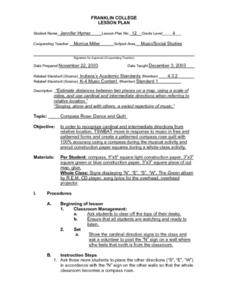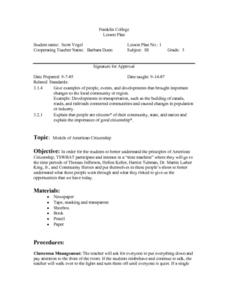Curated OER
A Famous Signature
Young scholars study important historical figures. In this United States history lesson, students trace the signature of John Hancock using cotton swabs, glitter, and various art supplies after discussing the historical...
Benjamin Franklin Tercentenary
From Ben’s Pen to Our Lives
What would Ben do? Jumping off from the pseudonymous letters Ben Franklin fooled his older brother into publishing when he was still a teenager, young literary lovers dive into acting, writing, and addressing a local issue with wit and...
Curated OER
What Your Signature Means to You and Others
Students discuss significance and value of writing their signatures on various documents, recall times they have signed their names, and demonstrate understanding that signatures are important representations of people, and symbols of...
Curated OER
Civic Oration Topic Planner "A Great Time in American History"
In this report planning worksheet, students prepare to write a 3-5 page report about one great time in American History. Students choose a topic, answer 4 questions to help in planning the report and take this form home for parental...
Curated OER
Billie Holiday's Song "Strange Fruit"
Pupils analyze a variety of primary source materials related to lynching (news articles, letters written to or written by prominent Americans, pamphlets, broadsides, etc.) in order to assess the effectiveness of the anti-lynching...
Curated OER
The First "Colored" World Series
Students utilize reading and listening skills in order to discover the key issues in American history and Black baseball history. Students investigate the beginning of the Negro Baseball Leagues and its signature historical baseball...
Curated OER
President Hoover and the Great Depression
Eleventh graders explore how President Hoover's conservative response to the Great Depression drew criticism from the American public. They watch a video clip outlining how hard times were during the Depression and take notes during the...
Curated OER
Abraham Lincoln's Young Years
Third graders explore the life of Abraham Lincoln. They read and discuss the life and times of Abraham Lincoln. Students write three sentences about an important part of the life of Abraham Lincoln. They edit and revise their sentences.
Curated OER
Religious and Political Changes in Europe
Eighth graders examine the Protestant Reformation and the Spanish Armada. After taking notes, they read an excerpt of their textbook and complete a worksheet. To end the lesson, they complete a timeline of the major events of both time...
Curated OER
Oceans
First graders examine how the earth is covered with more water than land. They toss an inflatable globe around the classroom, and each time a student catches the ball with two fingers, they tally whether the fingers land on water or...
Curated OER
Compass Rose: Dance and Quilt
Fourth graders identify the cardinal directions by listening to a song entitled, "Stand," and by reviewing the lyrics to that song. They notice the cardinal directions that are posted around the classroom. They perform the motions as...
Curated OER
Spin Cycle
Students explore the concept of "spin" and discuss how politicians use spin to sway public opinion. A leading American politician is selected and talking points that exemplify the main idea of this lesson are shared with the class.
Curated OER
Models of American Citizenship
Third graders investigate the concept of American citizenship by pretending to time travel. They travel back in time to visit the eras of Thomas Jefferson, Hellen Keller, Harriet Tubman, Dr. Martin Luther King, Jr., and community heroes....
Curated OER
Sticking to a Budget
Set scholars up for financial success by throwing them into the hypothetical real world.
Curated OER
How Laws Are Made
Students create a graphic organizer to illustrate the steps elected representatives must take to make a new law. Included: Student work sheet and role-play ideas. Students use their graphic organizers to write a paragraph briefly...
Curated OER
How were European nations capable of dominating the African contintnt?
Help your class determine why European was able to dominate the African continent. They read 5 excerpts, each related to a reason why Europe colonized Africa. Then they answer 4 critical-thinking questions.
Curated OER
How Were European Nations Capable of Dominating the African Continent?
Primary source documents provide a realistic context for pupils to explore. Included are 5 experts relating European ideals and methods for colonizing and controlling the African continent. Middle schoolers answer 4 critical-thinking...
PBS
1000 Words
A picture really can speak a thousand words—no matter how old! Scholars become history detectives as they learn how to analyze historical photos and evidence to uncover the past. The fun hands-on activity makes history come alive through...
Curated OER
The Bill of Rights and You
The right to life, liberty, and the pursuit of happiness. The lesson explains what the Bill of Rights is and how it applies to everyday life, like freedom of speech or the right to a jury trial. Young historians complete hands-on...
Curated OER
Living News: Classroom Materials
Students explore controversial current events. For this Bill of Rights lesson, students research selected issues and examine the issues from different perspectives. Students script and record news stories that feature their findings.
Curated OER
SOAPS Primary Source "Think" Sheet
Planning on using primary source materials? Introduce your class members to SOAPS, a worksheet that models how to analyze and reflect on primary source materials. Readers name the document, identify the subject (S), the...
Curated OER
Spooky Notes
Second graders move to, sing, compose, and interpret various musical techniques through the use of "America", Tchaikovsky's "Waltz of the Flowers", and a song called "Skin and Bones". Emphasis is placed upon identifying names and values...
Curated OER
Government
Second graders run for various offices. They dress up like a politician, pretend to be running for an office, and tell the students why they should vote for him/her. They explain why it is necessary for a community to have a government
Other popular searches
- Identify Time Signatures
- Music Theory Time Signatures
- 4/4 Time Signatures
- Compound Time Signatures
- Music Time Signatures
- Orff Time Signatures
- Irregular Time Signatures
- Or Ff Time Signatures
- 4\/4 Time Signatures























